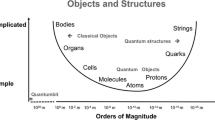Abstract
There have been suggestions that the unity of consciousness may be related to the kind of holism depicted only in quantum physics. This argument will be clarified and strengthened. It requires the brain to contain a quantum system with the right properties — a “Bose-Einstein condensate”. It probably does contain one such system, as both theory and experiment have indicated. In fact, we cannot pay full attention to a quantum whole and its parts simultaneously, though we may oscillate between the two. In a quantum theory of consciousness, emergent meanings arise as an inevitable consequence of Heisenberg's Uncertainty Principle.
Similar content being viewed by others
Author information
Authors and Affiliations
Rights and permissions
About this article
Cite this article
Zohar, D. A quantum mechanical model of consciousness and the emergence of ‘I’. Mind Mach 5, 597–607 (1995). https://doi.org/10.1007/BF00974988
Issue Date:
DOI: https://doi.org/10.1007/BF00974988




